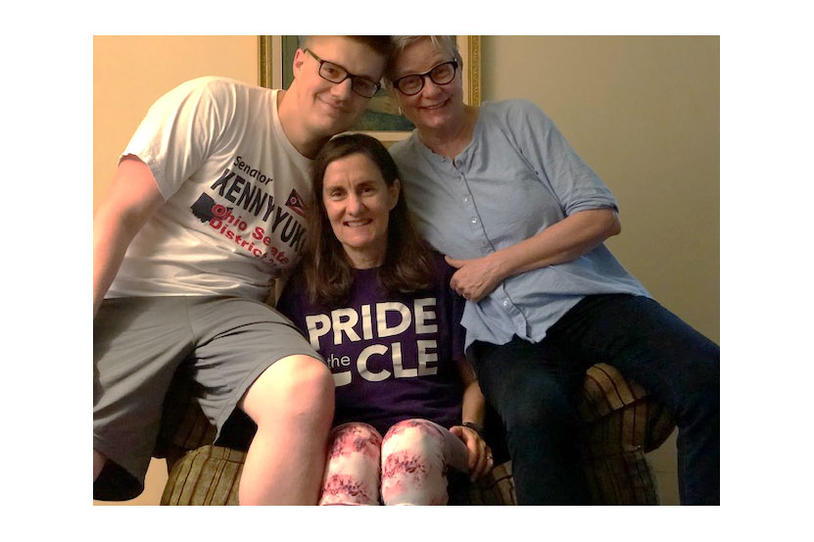
Carol Whitlatch (center) with her son and partner.
Life can be ironic. That was one of Carol Whitlatch’s first thoughts when she was diagnosed with Parkinson’s disease in December 2016, after years of suffering mild but mysterious symptoms, including twitching thumbs and increasing difficulty writing legibly. Whitlatch, 57 and a resident of Shaker Heights, Ohio, is a researcher who studies dementia and the effects on caregivers of people with dementia. “It has been really bizarre going from conducting research on people [with neurological issues] to being in the situation I’m in now. The irony is not lost on me.”
Whitlatch first attributed her symptoms to some vascular issues she had stretching back to childhood that had caused weakness in her left leg. But the symptoms grew harder to ignore, particularly when her older brother was diagnosed with Parkinson’s in 2006, after Whitlatch urged him to see a doctor. “I’m the expert, right? I know dementia,” she says. “But it was tough. Once I started recognizing my own symptoms, I tried not to be in denial, but it was hard to watch my brother decline and not think my future was going to be really rough.”
So far, Whitlatch’s symptoms have remained mild enough for her to continue working full-time. “The weirdest one is what I call ‘toe curling’—my toes curl up and backward, which can be painful. And my tiny writing irritates everyone.”
Once she was diagnosed, however, Whitlatch’s inner researcher took over and she signed up for Fox Insight. “I had already joined 23andMe because of my work, so I got to Fox Insight through them.”
The Michael J. Fox Foundation is collaborating with 23andMe to advance the understanding of Parkinson’s by integrating genetic and patient-reported information.
Whitlatch immediately took to the periodic questionnaires about her symptoms and daily activities. “I’m a person who does research—I never say no to a decent survey; I’m odd that way,” she laughs. But participating in Fox Insight gives her an emotional boost, as well. “Answering the questions totally makes me feel like it’s possible to make a difference here. Being involved feels like a natural fit.”
Whitlatch, who formerly hesitated to share her diagnosis with her colleagues, has now spoken publicly about having Parkinson’s and being part of Fox Insight. “I wanted to be out of the Parkinson’s closet,” says Whitlatch. “My life partner is a woman, and over the years, the two of us have come out in so many different ways,” she says. “This is a different kind of coming out. We’ve got to create less of a stigma around having Parkinson’s.”
To learn more or register for the study, visit Fox Insight.
